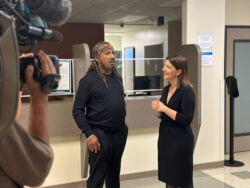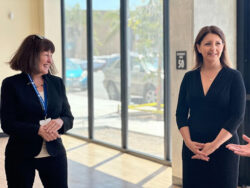
By Emily Kim Jenkins, Contributing Writer
Willard Stroud Jr. had a soft smile as he thought about how to answer the question posed to him. At first, he could only nod as tears brimmed in his eyes. The question was deceptively simple– “Are you satisfied with the care you’ve received?”
He had been invited to speak with Dr. Mandy Cohen, Director of the Centers for Disease Control and Prevention (CDC), who was visiting the San Diego Family Health Center of City Heights last month. Cohen toured the existing offices and spoke about the importance of mental health in anticipation of the Family Health Center’s new behavioral health facility, now under construction but expected to open sometime in June.

“What’s great about [the new facility] is obviously, dedicating a resource to mental health, but they embedded housing in it as well, and we know the link between stable housing and improvements in mental health is really strong,” Cohen told the Voice & Viewpoint. “And so I love that. Thinking about the whole person– how do we wrap around all the services that they need,” she said.
The National Institute on Minority Health (NIMH) reports that one in five Americans experience mental illness during any given year, and percentages of those who pursue treatment range dramatically depending on ethnicity. Only one in three Black Americans living with a mental health condition actually receive treatment, the Substance Abuse and Mental Health Services Administration (SAMHSA) found in 2020. African-Americans are 20 percent more likely to experience serious psychological distress than White Americans, the NIMH says, and several factors may prevent the seeking of treatment, especially in men. These factors may include a lack of access to health insurance, cultural stigmas around depression and trauma or living at or below the poverty line.
“[Mental health care] is a stigmatized ideal that Black folks have especially,” Stroud said. He says the stigma comes from the idea that seeking professional help means you’re not taking care of yourself. Born and raised in San Diego, Stroud struggled as a young man in the 80s and 90s before attending San Diego City College, where he decided to study psychology. That became the foundation for Stroud’s interest in protecting his own mind. That education, he says, is what helped him break through that stigma.
“If I would have known more about [mental health] in my younger years, I could have gotten some help sooner,” he said.
To help combat these disparities, organizations like the NIMH have put together campaigns

such as Brother, You’re On My Mind or Sista Afya’s Community Care to help provide information and gender-specific resources to encourage those in need to seek help.
While pondering how to discuss how much his time with the Family Health Center has meant to him, through misty eyes, Stroud proudly shared his strength.
“Since coming here, I’ve been able to share, open up about my life, things that I have faced in my life since childhood,” he said. Since seeing a counselor at the center, he says he is growing as a person and learning about how to set appropriate boundaries.
“Having more self esteem or self worth is so important. I study psychology, but that doesn’t stop or limit what I [deal with in] my own personal life. And so in order to study more to help others, I want to be healthy. And so that’s why I come here and look forward to coming here,” he said.

// PHOTO: Emily Jenkins

